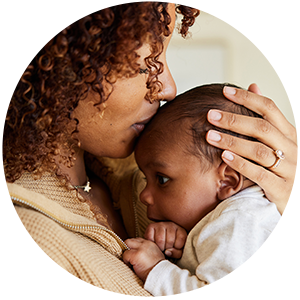
What to Know About RSV
With all the talk around RSV lately, you might be wondering what it is, why cases are surging right now, and what you can do to protect your family. These are all great questions, and we want to help answer them. That's why we've put together a little Q&A on the basics of RSV so you can stay informed if you think you or a loved one might have it and find ways to protect your family's health this season.
Q. What is RSV, and who can get It?
A. Respiratory Syncytial Virus (RSV) is a common respiratory virus during the winter months that can affect both children and adults. However, this season we are seeing more cases of younger children being affected. Just like COVID-19 and flu, RSV can also affect a person’s respiratory system.
While most people with RSV will feel like they have the common cold, some people are at higher risk from severe illness from it. These include older adults, infants and those with asthma and COPD. When RSV becomes severe, people can develop additional health concerns such as pneumonia and bronchiolitis.
Q. Why are cases so high this year in younger kids?
A. Experts believe cases are higher this year because many younger kids are just now being exposed to RSV. While most kids will be exposed to RSV before they turn 2, many have been isolated from school, daycare, and other places due to COVID-19 precautions and mandates. This has kept many young children from being exposed to it at a younger age.
Now that fewer COVID-19 guidelines are in place, like wearing masks and staying home, kids are back in settings where it's possible to be exposed to the virus—with many of them becoming sick all at once. As we get back to more in-person living, we may not see as many cases of RSV in kids each winter as we do this year.
Q. What are the symptoms of RSV?
A. There are a few symptoms to be mindful of if you think you or a loved one might have RSV. These symptoms include:
- Runny nose
- Decrease in appetite
- Coughing
- Fever
Younger infants may only experience irritability, decreased activity and appetite, and breathing difficulties. It's important to reach out to your doctor or visit an urgent care if you or a loved one is having difficulty breathing, not drinking enough fluids, or experiencing worsening symptoms. If symptoms become severe, visit your local emergency room.
Q. What can I do to reduce my risk of getting RSV?
A. There are plenty of ways you can keep yourself and your family healthy this season:
- Avoid close contact with sick people.
- Wash your hands.
- Cover your cough and sneeze.
- Clean and disinfect surfaces.
- Stay home when sick and keep children home from school when sick.
- Get vaccinated for flu and COVID-19 to reduce the risk of additional respiratory complications.
- Wear a mask in crowded environments and when using public transportation to travel for the holidays.
It's also important to consider changes you can make to your everyday lifestyle to help improve the health and well-being of those in your home. Keep these additional tips in mind:
- Make sure to get enough sleep.
- Stay Active
- Eat nutritious food
- Drink plenty of water to stay hydrated.
Let’s stay well this season!
We know seeing a surge of RSV cases in our community can make you feel worried or uneasy for your own family. What's important to remember is that RSV is preventable and there are ways to protect your family's health. Remember that even though the mask mandates have been lifted, it's okay to wear a mask if you or your family feel more comfortable wearing one.
Wearing a mask, especially in more crowded environments, can help slow the spread of illness and protect your health too! Plus, getting vaccinated against flu and COVID-19 can help reduce your risk of additional respiratory complications. Everyone 6 months and older is eligible to receive a COVID-19 and flu vaccine. For vaccine locations, visit: Vaccinate WA: Find COVID-19 Vaccine Providers Near You
For more information on RSV, visit: RSV (Respiratory Syncytial Virus) | SRHD
